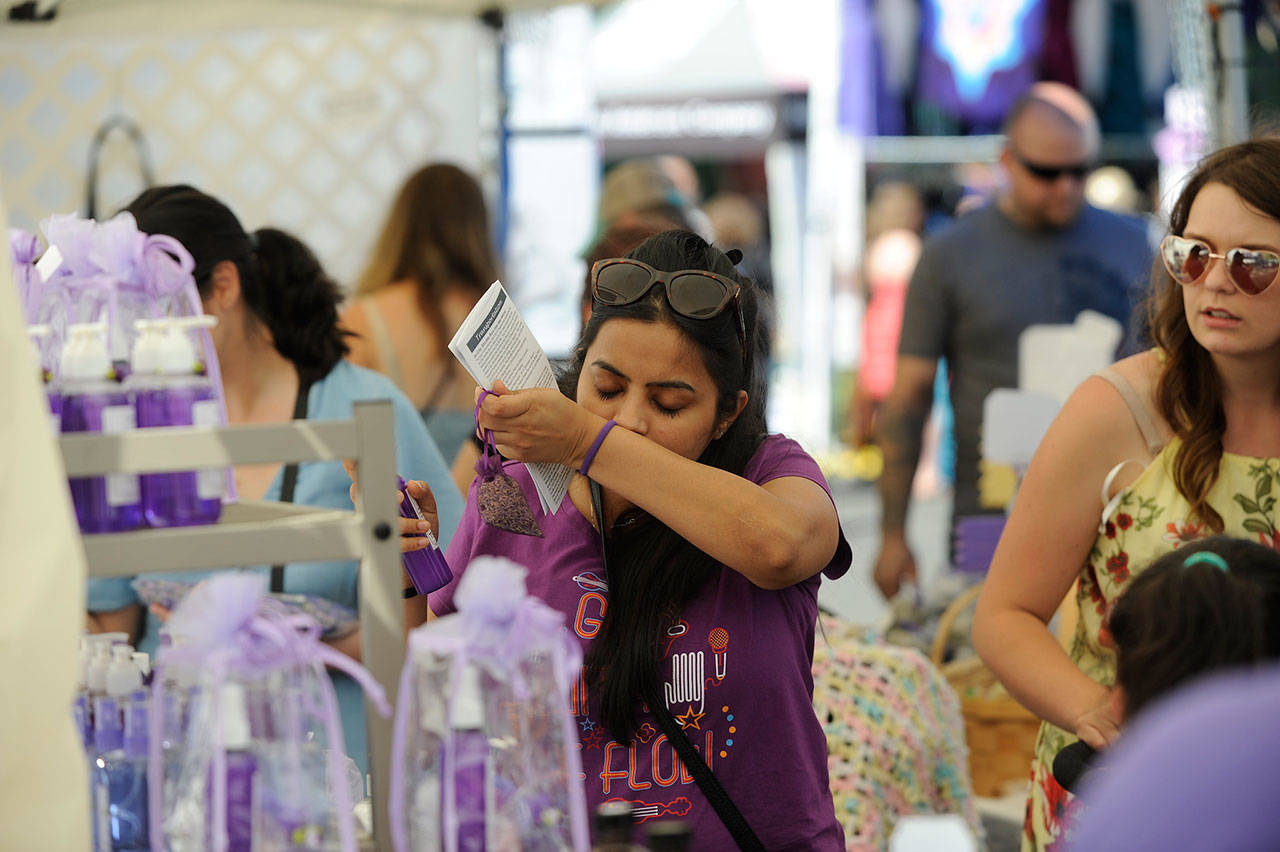SEQUIM — The COVID-19 pandemic has led leaders of the Sequim Lavender Growers Association to cancel its Lavender Festival Street Fair for a second consecutive year.
While this event will not happen this year, organizers of it and other lavender-related events say lavender farms and stores with the association and independent entities will remain open — or will open closer to summer months.
As one of the biggest tourist events in the Sequim area each year, the Street Fair ordinarily brings thousands of people to Carrie Blake Community Park for vendors, music and events as part of the Sequim Lavender Festival on the third weekend of July, which this year is July 16-18.
The festival is one of dozens of events in the area during Sequim Lavender Weekend, when lavender farmers and community group members work independently or together (see www. sequimlavender weekend.com, lavender festival.com and sequim lavender.org and their respective social media pages for more).
Mary Jendrucko, a Sequim Lavender Growers Association board member, said planning for the festival begins the previous year in November, with vendor applications going out by December and a jury deciding by February the lineup of fair vendors.
“It was a really hard decision (to cancel),” Jendrucko said. “We all hemmed and hawed. It was hard to say ‘no,’ but we want the environment to be safe, and we don’t feel it’s safe.”
In an online post, organizers wrote: “The health and safety of the Sequim Lavender Festival participants, guests and the Sequim Community are our highest priority, and given the guidelines set forth by the Governor of WA State regarding this ongoing global health crisis, the Sequim Lavender Growers Association felt it was best to act now to cancel the event in the park that draws thousands from all over the world.”
Jendrucko noted that the park and neighboring area is being used for COVID-19 vaccinations and food distribution, and it’s unknown if those would be continuing into July.
Finances
In recent years, the City of Sequim’s tourism months — particularly July — have become the highest sales tax times rivaling or exceeding December holiday sales. Even with the pandemic in place, July 2020 sales were up 3 percent from July 2019, and surpassed every other month from 2018-2020.
However, these sales taxes could be a result of an uptick from box store sales or some other combination.
For tourist-reliant businesses, however, Jendrucko said stopping the fair for a year is “disappointing because so many vendors really rely on our event.”
“I’m a vendor, too, and I rely on it, too,” she said. “I have $30,000 worth of product in my barn from last year.”
As an association, Jendrucko said it took a sizable loss in 2020 and that each year it makes a slim margin of profit from the fair.
She said the group received a $5,000 grant from the City of Sequim last year and hopes to continue to partner with the city in some capacity in the future for the event.
“The hardest part is disappointing our vendors and the community like the downtown business people because everyone benefits from the event,” Jendrucko said.
Despite the setbacks, Jendrucko said the association is trying to stay positive.
“The fortunate thing is the farms are so spread out,” she said. “If they want vendors, they might be able to have them (in July), and a lot of them have stores in season and year-round.”
Of Sequim’s dozens of lavender farms and businesses, many continue to offer online stores, walk-up windows, no contact pick-up/drop-offs and more. During the warmer months, some farms moved storefronts outside to better accommodate social distancing.
A week prior to last year’s Sequim Lavender Weekend, farmers learned that new regulations prevented them from having vendors, live music and outside food to limit gatherings.
“All these farms had fun stuff planned, but they had to pull the plug,” Jendrucko said. “That taught us a lesson that we don’t know what’s going to happen.”
She encourages locals and potential visitors to look into farms’ in-person and online stores.
As for the Lavender Festival, organizers are considering setting up a temporary stand to sell last year’s merchandise that was printed but not sold.
________
Matthew Nash is a reporter with the Olympic Peninsula News Group, which is composed of Sound Publishing newspapers Peninsula Daily News, Sequim Gazette and Forks Forum. Reach him at mnash@sequimgazette.com.

